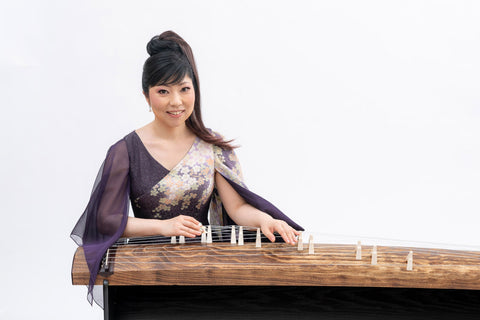
Musical Elegance | YOKO REIKANO KIMURA 木村伶香能•陽子
Consensus Through Music
YOKO REIKANO KIMURA(木村伶香能•陽子) is one of the most captivating artistic voices of Japanese koto and shamisen, consistently praised by critics for her musical elegance and versatile repertoire.
Based in New York and Japan, Reikano has concertized around the world including prestigious venues such as the Warsaw Autumn Festival, Israel Festival, University of Cambridge, John F. Kennedy Center, Lincoln Center, Metropolitan Museum, Kabuki-za, and various World Heritage Sites. Kimura has also performed Daron Hagen’s Koto Concerto: Genji with the Wintergreen Music Festival Orchestra conducted by Mei-Ann Chen and worked with renowned artists and organizations such as Heiner Goebbels, Wiener Solisten Trio, American Symphony Orchestra, and Basil Twist. Her awards include the first prize at the prestigious 10th Kenjun Memorial National Koto Competition, the Chamber Music America Classical Commission Program grant, and a scholarship from the Agency of Cultural Affairs of Japan.

Reikano is a founder of Duo YUMENO (Yumeno=of dreams), with cellist Hikaru Tamaki. The highlights of the duo’s performances include the Chamber Music America National Conference, the National Cherry Blossom Festival, and its 10th Anniversary Recital at Weill Recital Hall at Carnegie Hall. Reikano has studied with Kono Kameyama, a leading disciple of a legendary koto, and shamisen players Kin’ichi Nakanoshima, Senko Yamabiko – a Living National Treasure – and Akiko Nishigata.
IROHA: What projects are you currently working on? Please also feel free to mention what you have done most recently or plan to do in the near future.
REIKANO: Recently, I have been presenting my concert series, “Four Seasons of New York – Gems of Japanese Music”, featuring mainly classical Japanese koto and shamisen music. I'm active in both Japan and the United States. Unfortunately, in Europe and the U.S., it's hard to introduce koto music on a large platform. One of the unique phenomena I hope to share with others is that "when you can find a consensus through music, it becomes dramatically more interesting and delightful." It is difficult to foster this feeling if people are only exposed to a new instrument once or twice, so I hope that the sound will permeate and accumulate in the hearts of listeners through these recurring seasonal concerts.
My husband, cellist Hikaru Tamaki, and I also perform as Duo YUMENO. We are pioneering new chamber music through joint activities with excellent composers in Japan and the United States. This year, we plan to release an album, "Heike Quarto" (composed by Daron Hagen), which includes pieces commissioned and played in Japan, the United States, South America, and Europe since 2015. I'm very happy to have been collaborating with one of the most prominent opera composers in the United States for the past several years!
As a soloist, I will also play the Koto Concerto twice in April. This is planned to be recorded in the next few years, so I'm focused on doing my best.

IROHA: How do you see your role in society or in business?
REIKANO: This is a very delicate issue, and I've thought about it since I moved to the U.S. My husband's grandparents had the painful experience of living their newlywed life in Tule Lake (American concentration camp of Japanese citizens) during World War II. Born and raised in Japan, I rarely thought about the hardships that Japanese Americans (Nikkei) and Japanese people living abroad faced in the past. However, after moving to the U.S. and listening to various experiences from my family, I wonder how overseas communities of Asians became what they are today.
Individual-on-individual hate crimes against Asians in recent years and the act of states systematically ignoring these crimes and failing to defend human rights are fundamentally the same. It's a shame that hate crimes still exist. I think the cause of these hate crimes is a lack of sensitivity. People do not learn enough history and are not considerate of others. As a person involved in traditional Japanese music, I always want to play music with the delicacy of human beings in mind.

IROHA: Based on your background, do you have any advice or a message for young people who want to follow in your footsteps?
REIKANO: Value the opportunity to come into direct contact with real art, not just online. In an era of information overload, it is easy to seek a “quick result”, but it is very important to become aware of "something important that cannot be easily expressed in words", even as years pass.
IROHA: What is your favorite breakfast food?
REIKANO: French toast soaked overnight. (I like to eat it with maple syrup from Maine on weekends.)
